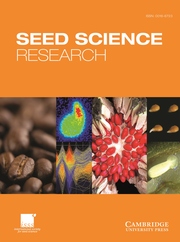Article contents
Heat shock and recovery in aged wheat aleurone layers
Published online by Cambridge University Press: 19 September 2008
Abstract
Ageing of wheat seeds (Triticum aestivum cv. Galahad, 1986 harvest) during storage is accompanied by an increase in the proportion of abnormal seedlings produced when aged seed lots germinate. The response of aleurone layers from normally and abnormally germinated seeds to heat shock has been investigated. [14C]-amino acid incorporation into aleurone layers from 3-d normally and abnormally germinated seeds diminished after 4 h at 42°C but the aleurone layers were able to recover significantly during a 5-h period at 20°C following heat shock. [35S]-methionine pulse-labelling of aleurone proteins showed that α-amylase isoenzyme synthesis was abolished upon heat shock in aleurone layers for both normally and abnormally germinated seeds and that only aleurone layers from normally germinated seeds were capable of recommencing substantial α-amylase synthesis during the recovery period. Heat shock caused aleurone layers from abnormally germinated seeds to synthesize polypeptides not synthesized by aleurone layers from normally germinated seeds under the same conditions. The synthesis of certain polypeptides by aleurone layers from abnormally germinated seeds was enhanced at 20°C, 42°C and during recovery compared with normally germinated seeds. These results are discussed in terms of the control of gene expression during heat shock and recovery during seed ageing.
- Type
- Research Papers
- Information
- Copyright
- Copyright © Cambridge University Press 1993
References
- 4
- Cited by


